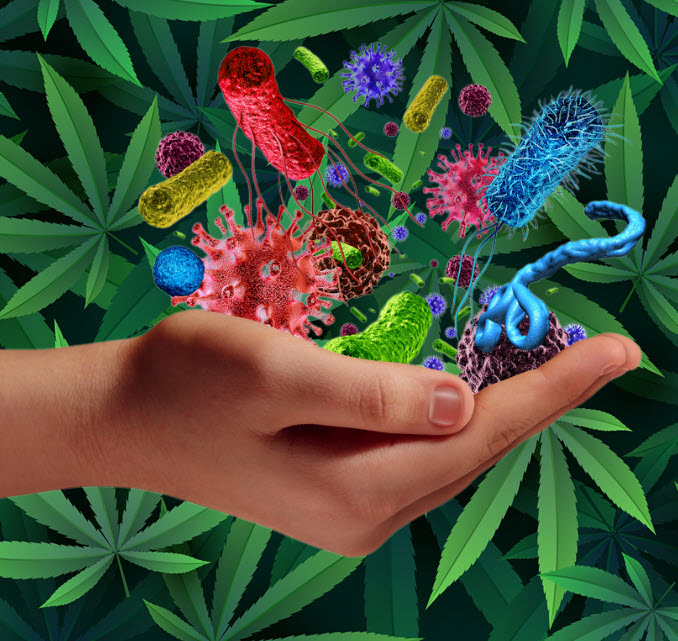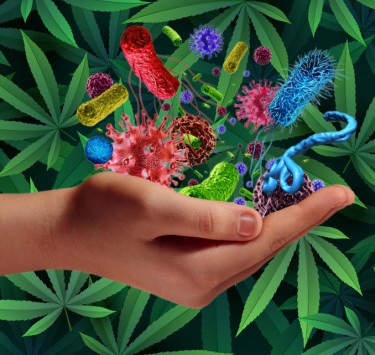Cannabis News
Let Cops Smoke Weed! – Possible Bill Would Exempt Police from State Protections Around Cannabis Use
Published
8 months agoon
By
admin

Let Cops Smoke Weed!
Should cops be allowed to smoke weed? Some are staunchly against it, but this stoner here believes it would make the world a better place. Love them or hate them, cops have an incredibly stressful job. They regularly encounter dangerous situations, witness traumatic events, and deal with hostile people. It’s no surprise that many officers suffer from PTSD, anxiety, and other mental health issues.
On top of that, the public’s perception of police is largely negative these days. Incidents of police brutality and abuse of power have eroded trust in law enforcement. Of course, not all cops are bad apples, but the reputation has taken a major hit. This animosity and stigma undoubtedly add to the already overwhelming stress and pressures they face.
Nonetheless, this doesn’t mean police officers should be excluded from cannabis use. In fact, regulated access to marijuana could potentially allow cops to finally connect with the public they are sworn to protect and serve. By legally partaking in the same vice that millions of law-abiding citizens enjoy, a human bridge could be built between the police force and the people.
Rather than being seen as an authority figure disconnected from the lives of ordinary citizens, a cop smoking a joint in their off-hours makes them significantly more relatable. It humanizes them. If regulated responsibly, cannabis use among law enforcement could paradoxically improve police-community relations and their mental wellbeing.
However, a new California bill threatens to move in the opposite direction. SB 1264 would prohibit various categories of public workers, including law enforcement officers, from lawful marijuana use that is currently protected under state employment laws. In this article, we’re going to explore why this proposed amendment is a step backwards and a terrible idea that could have serious negative ramifications.
The California bill in question, SB 1264, was originally introduced last month as a minor technical fix to an existing law protecting workers from employment discrimination over legal marijuana use. However, it took a controversial turn this week when it was substantially amended in committee with an entirely new section that would roll back those protections for various categories of workers.
The new amendment, sponsored by Republican Senator Shannon Grove, specifically removes the employment protections for “employees in sworn or nonsworn positions within law enforcement agencies” who have job functions related to:
-
Apprehension, incarceration, or correction of criminal offenders
-
Civil enforcement matters
-
Dispatch and public safety communications
-
Evidence gathering and processing
-
Law enforcement records
-
Animal control
-
Community services duties 8 ) Public administrator or public guardian duties
-
Coroner functions
This proposed change comes just months after the Commission on Peace Officer Standards and Training removed questions about marijuana from police job application forms, stating that several forms were “modified to remove inquiries about a candidate’s prior cannabis use.”
The legislation currently sits before the Senate Rules Committee after Grove’s amendments were adopted on Tuesday. If passed, it would represent a major setback for the employment protections that were established by two pieces of legislation signed into law in 2022 and 2023.
Those laws, which took effect on January 1st of this year, made it illegal for California employers to ask job applicants about past cannabis use or penalize most employees for lawful off-duty marijuana use. Certain exceptions were already included, such as workers in the building/construction trades and those requiring federal background checks, but this new amendment extends those exceptions even further.
Specifically, the 2022 law states it is “unlawful for an employer to discriminate against a person in hiring, termination, or any term or condition of employment, or otherwise penalizing a person, if the discrimination is based upon…off-duty marijuana use.”
The separate 2023 law prohibits employers from “requesting information from an applicant for employment relating to the applicant’s prior use of cannabis.”
If SB 1264 passes with the new amendment, it would nullify those protections for a huge swath of law enforcement employees across the state. From police officers to animal control workers to coroners, an entire sector of public service workers could once again face discrimination and job consequences for their personal cannabis use outside of work hours.
The potential rollback of such recently-enacted worker protections has voter advocacy groups and cannabis supporters sounding the alarm about the proposed changes. With the bill now awaiting a Senate Rules Committee vote, all eyes are on whether California lawmakers will side with the police unions pushing for the amendment or the wave of pro-cannabis worker policies that have been advancing.
If lawmakers are going to single out cannabis and prohibit its use among certain public employees like law enforcement officers, a glaring double standard arises: Why not enact the same draconian policies for alcohol?
By virtually every objective metric, alcohol is more dangerous and detrimental than cannabis. It’s more toxic, more addictive, and causes significantly more health issues and societal harm. Alcohol dependency can lead to life-ruining consequences like job loss, domestic violence, and севере organ damage. The same simply cannot be said about cannabis dependence.
Perhaps most importantly in the context of police work, alcohol is clearly linked to increased violent and irrational behavior in a way that marijuana is not. Over 40% of all violent crimes involve the presence of alcohol, according to data from the Department of Justice. Excessive drinking has been identified as the most significant predictor of intimate partner violence.
On the other hand, cannabis does not appear to be a major factor in violent crimes. In fact, some studies have found that marijuana use is associated with decreased domestic violence. While certainly not an excuse, alcohol’s disinhibiting effects resulting in aggressive behavior are well-documented. This makes the potential exception for law enforcement particularly concerning from a public safety standpoint.
Interestingly, there are no blanket policies prohibiting police officers and law enforcement from using alcohol off-duty, despite it being an objectively more impairing and destructive substance. An officer can get blindingly drunk on their day off, showing up to work hungover and potentially exhibiting residual impairment, and face no disciplinary action in most jurisdictions as long as they are no longer intoxicated on the clock.
Yet if that same officer consumed cannabis responsibly in their personal time, they could potentially be reprimanded or even fired solely due to outdated cannabis stigma rather than any evidence of real impairment or safety risks. This is fundamentally hypocritical.
The key difference is that the mere presence of THC metabolites can be detected through standard drug testing, weeks or even months after impairment from consumption. However, this alone does not indicate intoxication or impairment – it simply shows evidence of prior cannabis use, just as alcohol metabolites would indicate past alcohol consumption.
By specifically targeting cannabis in this way, the implicit argument seems to be that marijuana is so profoundly mind-altering and perception-warping that any prior use, regardless of timeframe, fundamentally compromises an individual’s ability to perform their duties. This is an argument not supported by science or data.
Perhaps this antiquated “reefer madness” mentality persisting in some lawmakers is the real concern driving these efforts. By treating cannabis as a unique demon to be stamped out at all costs, even among responsible adults, they reveal a dogmatic belief that marijuana is inherently immoral and eroding to society. This puritanical viewpoint fails to align with current realities around the plant’s mainstream acceptance and legalization in much of the country.
Police officers deal with immense stress and traumatic situations on a regular basis as part of their job duties. The consequences of this unrelenting pressure often manifest as PTSD, anxiety, depression and other mental health issues among law enforcement. Cannabis provides a non-toxic avenue to help manage these conditions without the dangerous side effects of alcohol or pharmaceuticals.
A 2022 study published in the Journal of Clinical Psychology found that cannabis consumption is associated with increased empathy levels and ability to share the emotional experience of others. For police officers, who can sometimes lose sight of the humanity in the communities they patrol, this empathy-promoting effect could be invaluable.
With more empathy, cops may be less inclined to strictly enforce draconian laws that criminalize victimless crimes like personal marijuana cultivation or possession. They could start focusing more resources on actual violent crime that damages society. A force occupied with busting down doors over roaches is one that lets murderers and rapists run free.
A more relaxed, empathetic police force could foster greater trust and cooperation with the public they serve. When the people view law enforcement with less fear and animosity, it becomes harder for real criminals to hide and operate within those communities. Aligning police and citizens makes it a tough day for crime.
At its core, cannabis is a plant that millions worldwide use to unwind, relax, and bring joy and peace into their lives. To declare that certain categories of public servants don’t have the same fundamental human right to make this choice is to assert a repugnant authoritarian notion – that there are two classes of people: those subjected to the law, and those upholding it.
For officers risking their lives daily, being denied a plant-based reprieve from their immense stress and trauma is not just contradictory policy, it’s institutionalized discrimination cloaked in outdated reefer madness. If we truly want equality in this country, we need to start by treating everyone equally, regardless of their profession or civilian status.
The same laws, freedoms, and human rights need to apply universally.
POLICE USE WEED AFTER WORK? READ ON…
HOW NEW JERSEY STARTED A TALK ABOUT COPS USING WEED AFTER WORK!
You may like
-


Dutch police find gnome made of MDMA during drug bust
-


Rejected applicants sue Minnesota over marijuana social equity licensing process
-


4 Ways Marijuana Can Help You Have A Better Thanksgiving
-


Can Big Alcohol Help The Cannabis Industry
-


California Appeals Court Rejects Marijuana Grow Permit, Citing Federal Illegality
-


Expert Lighting Tips For Successful Indoor Growing Weed
Cannabis News
California Appeals Court Rejects Marijuana Grow Permit, Citing Federal Illegality
Published
22 hours agoon
November 22, 2024By
admin
In a landmark decision that highlights the tension between state and federal cannabis laws, a California appellate court ruled on October 29th that property owners can refuse to allow the transportation of cannabis across their land via easements, even when the cannabis operation is approved by local authorities.
The Second District Court of Appeal’s unanimous decision draws attention to private property rights in a context where cannabis remains federally illegal, but state law allows licensed cultivation, distribution and sale. Presiding Justice Albert Gilbert stated, “No matter how much California voters and the Legislature might try, cannabis cultivation and transportation are illegal in California as long as it remains illegal under federal law.” JCCrandall LLC v. County of Santa Barbara, Case No. B333201, 2024 WL 4599304, Oct. 29, 2024.
Unless the California Supreme Court grants review – which I would not rule out – the decision empowers private property owners to refuse to contract with cannabis businesses, and restricts local government from approving cannabis operations that implicate the property rights of neighbors who object.
The case at hand
The dispute centered around a cannabis cultivation operation in Santa Barbara County, where JCCrandall LLC challenged a conditional use permit granted by the County to its neighbor, Santa Rita Holdings Inc. The critical issue was that Santa Rita Holdings could only access its 2.5-acre cannabis farm via an unpaved road crossing JCCrandall’s property through a pre-existing easement. JCCrandall grows oats and barley.
JCCrandall’s primary concern? It raised a number of complaints with the Santa Barbara County Supervisors about truck traffic and night operations, which did not gain traction, but in the Court of Appeal JCCrandall focused on what it claimed was potential liability associated with having federally illegal substances transported across its property, even though County regulators found that the Santa Rita operation was fully compliant with state and local laws.
Key legal findings
The appellate court’s decision hinged on several crucial points:
- Property Rights: The court emphasized that “the right to exclude others is the essence of the right of property ownership” and classified it as a fundamental vested right.
- Federal Supremacy: The panel determined that allowing cannabis transportation across private property “defies the Supremacy Clause” of the U.S. Constitution.
- State vs. Federal Law: While cannabis might be legal under California law, the court ruled that federal law’s prohibition takes precedence in this context.
California cannabis industry implications
Legal experts suggest this ruling could have far-reaching consequences for California’s cannabis industry. Section 1550.5(b) of the California Civil Code makes contracts within California involving cannabis lawful and enforceable, and Santa Rita Holdings bet the ranch on that argument. But the Court of Appeal held that the statute could not compel a landowner to allow cannabis to travel across its property on a pre-existing easement. Licensed operators may find it harder to do business because neighbors who have property rights affected by a cannabis business can object, and, under the JCCrandall ruling, local government must yield to those objections.
An example might be a cannabis dispensary that depends on access to its parking lot via an easement or is located in a shopping center where other lessees have rights to object to tenants notwithstanding the approval of the landlord. In cultivation, many cannabis farms depend on vehicular access through easements because they are remote and do not always have direct access to public thoroughfares, or they depend on water sourced from other properties pursuant to agreements made by prior owners who grew traditional crops. These neighbors might not need to show any negative impact on their property, but can argue that they could be found complicit in federally illegal activities.
I think the most problematic language in the JCCrandall ruling is the following, which might draw the attention of the California Supreme Court and cause it to grant review: “For as long as an easement is enjoyed, its mode and manner of use shall remain substantially the same as it was at the time the easement was created. The County argues the easement was used for agricultural purposes. But there is a vast difference between legal and illegal agricultural purposes.” (Emphasis added.) If California has determined that cannabis cultivation is legal – as it has – and state courts routinely enforce contracts involving cannabis, it is a pretty bold step to declare the use of a lawful pre-existing easement illegal simply because the agricultural crop is cannabis and take away easement access from Santa Rita.
Looking ahead
This decision creates new challenges for cannabis businesses in California, and will result in more disputes among neighbors. While the Biden administration has shown signs of easing federal marijuana restrictions, this ruling demonstrates that the federal-state law conflict continues to create significant legal hurdles for the cannabis industry.
California court decisions also can be persuasive authority in other states, so we might see similar litigation (and decisions) elsewhere in the country where cannabis has been legalized.
The case serves as a reminder that despite California’s progressive stance on cannabis, federal prohibition continues to cast a long shadow over the industry’s operations and development. As the cannabis landscape continues to evolve, this ruling may prompt businesses to reassess their property arrangements and local governments will certainly have to reconsider their permitting processes to give more careful consideration to objections by neighbors who claim that their property rights are implicated by cannabis operations.
Note: This post was first published earlier this month on the Alger ADR Blog.
Cannabis News
Autoimmune Conditions Are Rising Fast in American Medicine, Can Cannabis Help?
Published
2 days agoon
November 21, 2024By
admin

Why Are Autoimmune Conditions On The Rise? And How Cannabis Can Help
Autoimmune diseases refer to a group of medical conditions that occur as a result of the immune system attacking your own tissues.
In a normal human body, the immune system is responsible for protecting the body by producing antibodies that prevent toxins, cancer cells, and viruses from harming the body. However, when one is struck by an autoimmune disorder, the immune system is no longer able to distinguish the difference between dangerous cells and healthy cells. As a result, the healthy cells are attacked, too.
Today, we know of around 100 different kinds of autoimmune conditions. Some of the most common examples of autoimmune conditions include rheumatoid arthritis (RA), lupus, inflammatory bowel disease, celiac disease, Type 1 diabetes, multiple sclerosis (MS), and the Guillain-Barre syndrome (GBS) to name a few. Others include Graves’ disease, Hashimoto’s thyroiditis, psoriasis, and vasculitis.
According to the National Health Council, around 50 million Americans are affected by autoimmune diseases today. This is a conservative estimate, considering that several autoimmune conditions are tricky to treat and so many people go undiagnosed for long periods of time. It’s worrisome to note that there are more people developing autoimmune diseases these days, many of which have reached levels comparable to epidemics.
But cannabis can help!
How Cannabis Can Help Curb And Manage Autoimmune Diseases
Not one single cause is responsible for the alarming growth of autoimmune diseases, though there are several factors at play. While there isn’t just one cause we can point at, it’s certain the reasons lie in our environment. After all, human genetics haven’t changed significantly yet the chemicals, toxins, and pollutants in our food and everyday items have risen dramatically.
In addition, people are getting less sleep than ever; stress rates are through the roof, and people are constantly worried. There is a clear link between psychological stress and physical health as well as immunity, which is why it isn’t unusual – it’s even common – to see many autoimmune disease cases flare up after people experience severe stress caused by grief, an accident, job loss, or the death of a loved one. These highly stressful and traumatic conditions wreak havoc on the body’s immune response, causing inflammation all over the body.
Conventional treatments prescribed to treat autoimmune conditions are focused on taming inflammation; these usually include steroids but also some non-steroidal drugs. These drugs often come with unwanted side effects, but research has shown that cannabis can work with the endocannabinoid system through THC and CBD, as well as other cannabinoids, to simulate similar results. In one study for example, we can see the clear association of the endocannabinoid system for neurodegenerative and inflammatory processes seen in Multiple Sclerosis and Amyotrophic Lateral Sclerosis.
There has also been an increasing number of studies proving the efficacy of cannabis for treating several autoimmune conditions.
Cannabis For Multiple Sclerosis
Multiple sclerosis is one of the autoimmune conditions where a growing number of studies have come out supporting the therapeutic benefits of cannabis for. In a 2024 study, patients with multiple sclerosis reported several improvements in quality of life after using cannabis-based medical products (CBMPs). For the study, British investigators analyzed the impact of cannabis based medicinal products made from either oil or extracts in 141 patients who were enrolled in the UK Medical Cannabis Registry.
The researchers then analyzed the changes in patient outcomes after a month, then three and 6 months after. According to the patients themselves, they were able to sustain improvements in their mental and physical health after marijuana therapy.
“This case series demonstrates a potential association between the initiation of CBMPs and improved patient reported outcomes in sleep, anxiety, and general HRQoL [health-related quality of life] measures, over six months,” said the study authors. “Additional measures for HRQoL, including various physical and mental health subdomains, also exhibit improvements up to six months when compared to baseline,” the authors concluded.
In another study from 2023, patients with multiple sclerosis reported significant improvements in symptoms after cannabis use. For the study, researchers from the Dent Neurologic Institute in Buffalo, New York, analyzed the medical records of 141 patients with multiple sclerosis, who were also legally authorized to consume medical marijuana products. They then analyzed data from the patients after one up to 4 follow-up sessions after the initial session of cannabis therapy. Sixty-five percent of patients consumed 1:1 THC:CBD tinctures.
According to the authors: “The results of this study indicate that use of MC [medical cannabis] to alleviate symptoms of MS is largely efficacious, with improvement in pain (72 percent of patients), muscle spasticity (48 percent of patients), and sleep disturbance (40 percent of patients) frequently reported.”
“More than half of opioid users at baseline were able to either discontinue or decrease their opioid use after starting MC. The mean daily MME [morphine milligram equivalents] was significantly reduced from the initial visit (51 mg) to the last follow-up visit (40 mg). This is consistent with previous literature showing that MC legalization is associated with decreased opioid use and that MC use is associated with decreased opioid use in patients with chronic pain. These findings indicate that MC may represent an alternative analgesic to opioids for some patients,” they wrote.
Anecdotal Evidence
While more studies are needed to determine cannabis’ effect on other autoimmune conditions such as rheumatoid arthritis, we can rely on anecdotal evidence. In 2020, data from the medical journal, Rheumatology, revealed that patients who have this condition, along with those who have lupus and fibromyalgia, consume cannabis.
In fact, it was reported that marijuana was extremely common especially for patients with fibromyalgia. “In this meta-analysis, we found that one in six patients suffering from rheumatologic disease actively consumes cannabis, reducing pain reduction… A favorable effect of cannabis on pain in our meta-analysis reinforces the idea that cannabis could be used for analgesic purposes,” the authors concluded.
Conclusion
Cannabis is a safe and natural way to help prevent and treat the symptoms of autoimmune disease. It targets inflammation at its root, and is a proven natural way to help cope with stress, pain, insomnia, and inflammation all while protecting the brain. However, it’s important to ensure you medicate with clean, organic sources of marijuana.
AUTOIMMUNE AND CANNABIS, READ ON…

The U.S. Senate’s version of the Farm Bill finally landed this week. They’re calling it the Rural Prosperity and Food Security Act of 2024 (the “Senate bill”). The Senate bill follows on the House’s proposal, called the Farm, Food and National Security Act of 2024 (the “House bill”), offered in May. Neither the Senate bill nor the House bill would preempt state or Indian law regarding hemp or the regulation of hemp products. This means states and tribes will retain a lot of latitude in regulating hemp and hemp-derived products– which gets people fired up.
Aside from giving states some runway, the Senate bill and the House bill differ in key respects regarding hemp. Therefore, these august bodies must confer and reconcile their sundry proposals. That could happen in 2024, but seems more likely in 2025 when the new Congress convenes. As of this week, though, we finally have a framework.
The Senate Bill re-defines “hemp” and defines “industrial hemp”
Section 10016 of the Senate bill (“Hemp Production”) amends the definition of “hemp.” Hemp was defined in the 2018 Farm Bill and removed from the federal Controlled Substances Act (CSA), taking us on a truly wild ride. See: What Happened to Hemp? (“What Happened”). The Senate bill also gives us a definition for “industrial hemp.” Here are those definitions, with points of emphasis in bold:
(1) Hemp. The term “hemp” means (A) the plant Cannabis sativa L. and any part of that plant, including the seeds thereof and all derivatives, extracts, cannabinoids, isomers, acids, salts, and salts of isomers, whether growing or not, with a delta-9 total tetrahydrocannabinol concentration (including tetrahydrocannabinolic acid) of not more than 0.3 percent on a dry weight basis; and (B) industrial hemp.
(3) Industrial Hemp. The term “industrial hemp” means the plant Cannabis sativa L. if the harvested material (A) is only (i) the stalks of that plant, fiber produced from those stalks, or any other manufactured product, derivative, mixture, or preparation of those stalks (except cannabinoid resin extracted from those stalks); (ii) whole grain, oil, cake, nut, hull, or any other compound, manufactured product, derivative, mixture, or preparation of the seeds of that plant (except cannabinoid resin extracted from the seeds of that plant); or (iii) viable seeds of that plant produced solely for production or manufacture of any material described in clause (i) or (ii); and (B) will not be used in the manufacturing or synthesis of natural or synthetic cannabinoid products.
The new regime
Again, the definitional stuff in bold is what I want to emphasize.
First, the Senate bill keeps the THC threshold at 0.3 percent, which is an arbitrary number we’ve been advocating against for years. The Senate bill mirrors the House bill in this respect, though, so we are stuck with this, unless Ron Paul gets his way.
Second, the Senate bill keeps the 2018 Farm Bill’s total THC standard, including THCA. The House bill does this too. This was fairly predictable: in What Happened, I wrote that we could “expect the total THC standard to remain, which means that actual Delta-9 THC won’t be the only metric for calculating THC content.”
We’ve also explained on this blog that the 2018 Farm Bill and USDA rules mandate total THC testing on pre-harvest hemp batches, but do not mandate such testing on post-harvest hemp or hemp products. The Senate bill doesn’t change this paradigm, which means the “loophole” for gas station weed remains open. This proposal is a big win for opponents of the House bill’s “Miller Amendment,” which would narrow the definition of “hemp” to exclude intoxicating hemp-derived substances.
Third, the Senate bill introduces a new definition and framework for industrial hemp. The House bill does this too, albeit slightly differently. The idea here is to invite farmers to grow hemp for fiber and grain purposes, while freeing them from regulatory burdens with the Department of Agriculture and criminal exposure with the Department of Justice. More specifically, for “industrial hemp” growers, the Senate bill:
- removes background check requirements;
- instates “relaxed regulatory requirements” for sampling and inspection methodologies (which will need to be adopted by rule); and
- develops a certified seed program.
The Senate bill also makes any hemp producer ineligible to grow hemp for five years if that producer, “with a culpable mental state greater than negligence, produces a crop of hemp that is inconsistent with that license.”(Hint: use the seed program.) The proof standard here seems like it could be an issue, and even if anyone has been adjudicated as growing marijuana under the guise of hemp, Farm Bill ineligibility seems like a far-off concern.
Bottom line
The big takeaway for me is that the Senate bill leaves the door open for intoxicating hemp products, whereas the Miller Amendment to the House bill does not. Something’s gotta give. And it needs to happen soon, because we’re already long overdue. As I explained in a webinar last week, the Farm Bill deals with the nation’s entire food supply, not just hemp. Therefore, this is not like with the SAFE Banking Act, where we have a proposed law specific to cannabis that may or may not ever pass. The Farm Bill must pass, and soon.
Stay tuned and we’ll keep you updated on any major happenings. For more on this topic, check out our massive hemp and CBD archive, or these specific, recent posts:

Dutch police find gnome made of MDMA during drug bust

Rejected applicants sue Minnesota over marijuana social equity licensing process

4 Ways Marijuana Can Help You Have A Better Thanksgiving

Can Big Alcohol Help The Cannabis Industry

California Appeals Court Rejects Marijuana Grow Permit, Citing Federal Illegality

Expert Lighting Tips For Successful Indoor Growing Weed

Acne And CBD: Exploring Alternative Dermatological Solutions

Can I Gift Marijuana This Holiday Season?

The Best Cocktails For An Easy Festive Thanksgiving

420 Vacations: Planning the Perfect Weed Vacation

Distressed Cannabis Business Takeaways – Canna Law Blog™

United States: Alex Malyshev And Melinda Fellner Discuss The Intersection Of Tax And Cannabis In New Video Series – Part VI: Licensing (Video)

What you Need to Know

Drug Testing for Marijuana – The Joint Blog

NCIA Write About Their Equity Scholarship Program

It has been a wild news week – here’s how CBD and weed can help you relax

Cannabis, alcohol firm SNDL loses CA$372.4 million in 2022

A new April 20 cannabis contest includes a $40,000 purse

Your Go-To Source for Cannabis Logos and Designs

UArizona launches online cannabis compliance online course
Trending
-

 Cannabis News2 years ago
Cannabis News2 years agoDistressed Cannabis Business Takeaways – Canna Law Blog™
-

 One-Hit Wonders2 years ago
One-Hit Wonders2 years agoUnited States: Alex Malyshev And Melinda Fellner Discuss The Intersection Of Tax And Cannabis In New Video Series – Part VI: Licensing (Video)
-

 Cannabis 1012 years ago
Cannabis 1012 years agoWhat you Need to Know
-

 drug testing11 months ago
drug testing11 months agoDrug Testing for Marijuana – The Joint Blog
-

 Education2 years ago
Education2 years agoNCIA Write About Their Equity Scholarship Program
-

 Cannabis2 years ago
Cannabis2 years agoIt has been a wild news week – here’s how CBD and weed can help you relax
-

 Marijuana Business Daily2 years ago
Marijuana Business Daily2 years agoCannabis, alcohol firm SNDL loses CA$372.4 million in 2022
-

 California2 years ago
California2 years agoA new April 20 cannabis contest includes a $40,000 purse





